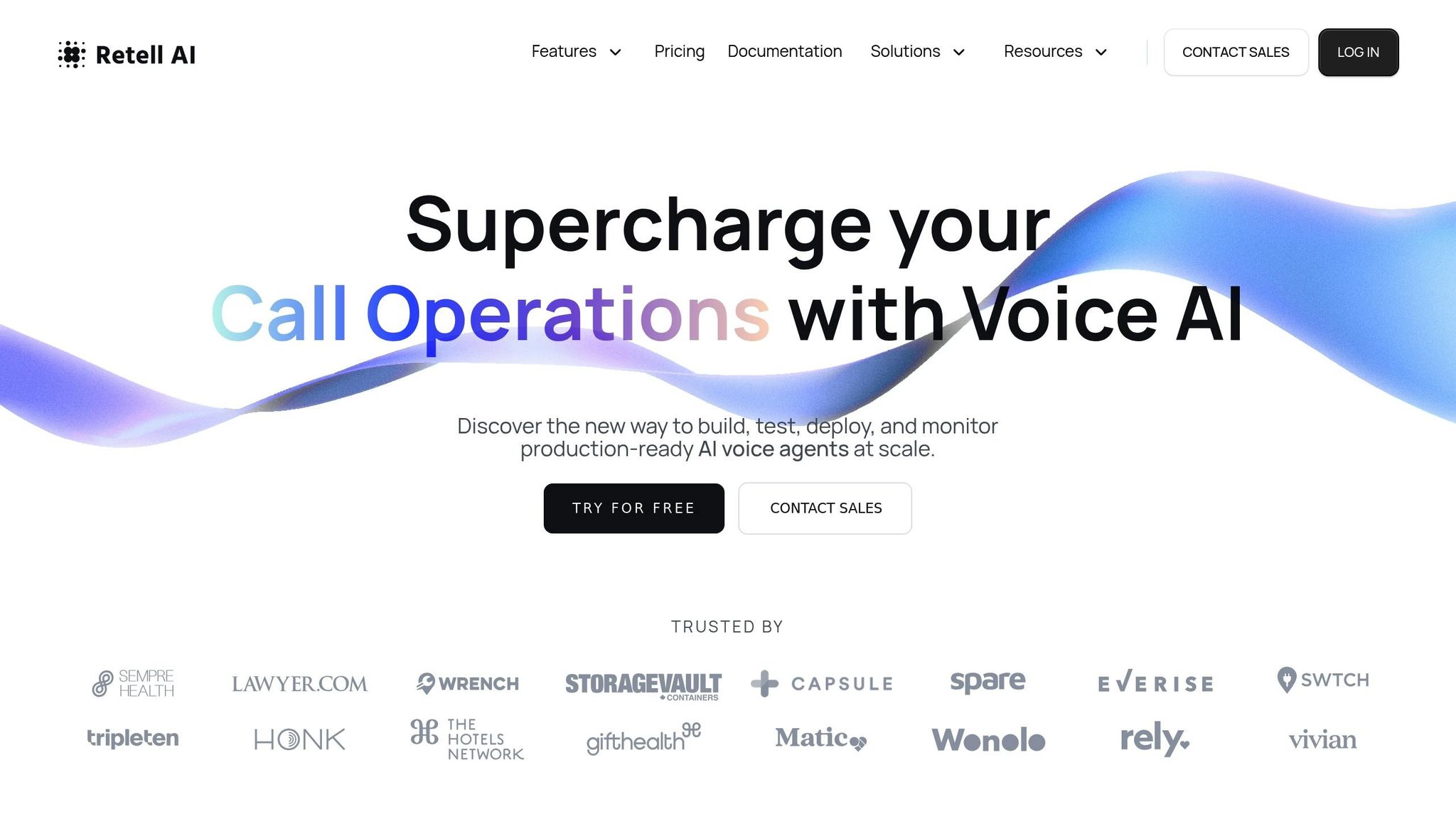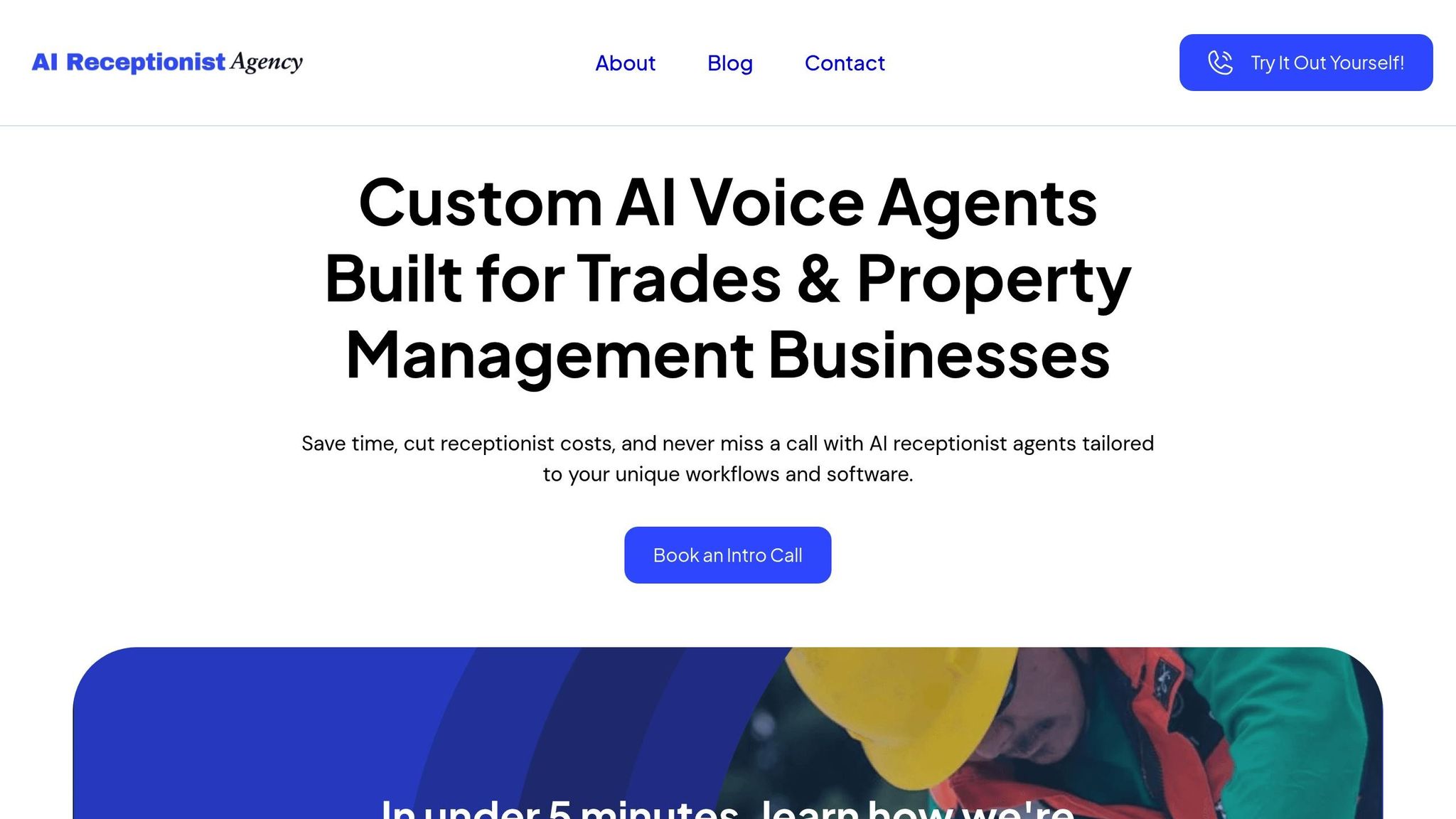
Missed calls and language barriers cost real estate businesses millions annually. Multilingual AI receptionists solve this by providing 24/7 service, handling multiple languages, and automating lead management - all at a fraction of the cost of hiring staff.
These tools streamline operations, improve client communication, and expand market reach for property managers and real estate firms. However, while AI excels in efficiency, it lacks human empathy and struggles with complex queries, making human oversight essential in critical interactions.


The AI Receptionist Agency offers a multilingual AI-driven solution designed to tackle communication hurdles in real estate and property management. Here’s a closer look at the standout features that transform how the industry handles communication.
This service ensures round-the-clock call handling, so you never miss a lead. Whether it’s answering inquiries, scheduling appointments (including virtual showings), addressing maintenance issues, or managing urgent tenant requests, the AI receptionist is always on duty. This continuous availability helps turn leads into actual sales or rental agreements. Plus, its ability to support multiple languages ensures accessibility for a diverse client base.
With built-in multilingual capabilities, the AI system enables property managers to communicate effortlessly in their clients’ preferred languages. It offers smooth language transitions and culturally sensitive interactions, helping businesses connect with a broader audience.
Lead management becomes a breeze with automated processes that qualify prospects, gather essential contact details, and prioritize high-value leads. The system also automates follow-ups for scheduled showings and verifies caller information. To keep potential buyers engaged, digital brochures can be sent via SMS or email.
This solution slashes overhead costs by up to 60% while increasing lead conversion rates by as much as 50%. Starting at just $199 per month, with a one-time setup fee of $499, it’s an affordable alternative to hiring multiple reception staff. This frees up resources, allowing property managers to focus more on building client relationships and expanding their portfolios.
While cutting-edge AI tools are reshaping receptionist workflows, it's important to first understand the traditional practices they aim to improve. In real estate and property management, these conventional workflows often struggle to keep up with the fast-paced and diverse demands of today's markets. By examining these standard processes, we can see why multilingual AI receptionists are becoming a game-changer.
Traditional reception services are typically limited to standard office hours - 9:00 AM to 5:00 PM, Monday through Friday. This schedule leaves significant gaps, especially when it comes to capturing leads or addressing client concerns outside of these hours. These limitations become even more pronounced when dealing with international clients across multiple time zones, where availability mismatches can result in lost opportunities.
Meeting the language needs of diverse clients is another area where traditional workflows often fall short. Property managers may hire bilingual staff or rely on translation services, but these solutions come with challenges like scheduling conflicts, higher costs, and potential communication errors. Studies show that 76% of consumers prefer buying products with information in their native language, and 70% of customers are likely to switch brands if they don’t receive support in their preferred language. For businesses, the lack of multilingual support could mean losing up to 75% of B2B and B2C buyers.
"Communicating with customers and prospects in their native language can improve the quality of interactions and strengthen relationships with them, resulting in better customer loyalty." - Salvador Ordorica, CEO of The Spanish Group LLC
The importance of multilingual support is particularly evident in the real estate market. In 2023, The National Association of Hispanic Real Estate Professionals (NAHREP) reported a net gain of 450,000 new Latino households, highlighting the growing need to cater to Spanish-speaking homebuyers.
Lead management is another area where traditional workflows reveal their limitations. Receptionists often rely on manual processes to collect basic information and pass it along to agents. This approach can be inconsistent, time-consuming, and prone to human error. Without automation, critical details may be overlooked, and follow-ups can fall through the cracks.
AI integration, on the other hand, has been shown to grow sales pipelines by 30% and increase conversions by 15%. Additionally, automated lead qualification can improve campaign effectiveness by over 50%. By handling routine tasks and analyzing data in real-time, AI ensures that promising leads are prioritized and nurtured without delay.
Traditional workflows also tend to be more expensive due to manual processes and inefficiencies. For example, inconsistent follow-ups or missed opportunities can lead to higher labor costs and lost revenue. AI-powered tools in property management can automate up to 90% of routine tasks, improve team productivity by 40%, and reduce operating expenses by 15%. Without automation, businesses risk spending more while achieving less in terms of lead engagement and operational efficiency.
When comparing multilingual AI receptionists to traditional workflows, several important differences come to light. These distinctions can help property managers decide on the best communication systems for their needs.
AI receptionists provide 24/7 support, reducing missed calls by 25%. This is especially important considering that 62% of calls to small businesses go unanswered. On the cost side, traditional receptionists can exceed $77,000 annually, while AI solutions start at just $285 per month. These systems not only cut call-related expenses by 50% but also increase service revenue by nearly 20%.
AI receptionists excel at scalability, handling thousands of inquiries at once without delays. They also ensure consistent, protocol-driven responses, eliminating the variability that can come with human staff. This automation reduces the need for hiring and training, saving both time and money.
With 97% speech recognition accuracy and over 85% navigation precision, multilingual AI systems are a game changer. They help businesses reach a broader audience, addressing the fact that 42% of consumers avoid products or services presented in unfamiliar languages. Companies that adopt strong language support see benefits like 32% better team cohesion and a 28% drop in miscommunication issues.
However, while these systems offer significant advantages over traditional setups, they’re not without their challenges.
AI receptionists can sometimes miss the mark, especially when users use vague or overly informal language. They may also struggle with complex, nuanced queries. Technical hiccups, like dropped connections, can disrupt conversations. The quality of AI performance hinges on its training data; insufficient data can lead to issues like poor accent recognition or difficulty detecting user intent. Additionally, weak integration can hinder access to customer information. These challenges highlight the importance of maintaining human oversight in critical real estate communications.
Despite advancements, AI interactions can still feel impersonal. Unlike humans, AI lacks the empathy needed to navigate customer frustrations effectively.
| Criteria | Multilingual AI Receptionists | Standard Receptionist Workflows |
|---|---|---|
| Availability | 24/7 operation across all time zones | Limited to business hours (9 AM - 5 PM) |
| Cost | $285–$3,000/month depending on features | $77,000+ annually, including benefits |
| Language Support | Instant multilingual capabilities | Requires hiring bilingual staff or translation services |
| Scalability | Handles unlimited simultaneous calls | Limited by staff capacity |
| Consistency | Follows protocols accurately every time | Varies by individual performance |
| Emotional Intelligence | Limited empathy and human connection | Natural emotional understanding |
| Complex Problem Solving | Struggles with nuanced situations | Excels at creative solutions |
| Setup Requirements | Initial training and system integration | Hiring, training, and ongoing management |
The shift toward AI in property management is undeniable. Gartner forecasts that by 2028, 33% of enterprise software applications will incorporate AI agents. The global AI assistant market has already surpassed $10 billion. For property managers, AI receptionists can take over routine tasks, allowing human agents to focus on complex or emotionally sensitive interactions. These evolving dynamics highlight the growing balance between AI benefits and traditional methods in property management communication.
Multilingual AI receptionists are transforming communication in the real estate industry, tackling challenges with cutting-edge solutions. The financial benefits alone are striking - while traditional receptionists can cost over $77,000 annually, AI alternatives start at just $285 per month. Companies adopting these systems report impressive results, such as a 10x boost in lead conversion rates and a 60% drop in operational costs.
In today’s diverse real estate markets, multilingual functionality has become a game-changer. AI systems capable of analyzing inquiries in real time ensure that 60% of calls turn into qualified leads. This capability not only breaks down language barriers but also facilitates market expansion, allowing property managers to connect with a broader audience.
With unlimited call handling and consistent, protocol-based responses, these tools deliver reliability and scalability. This makes them an invaluable asset for thriving in a competitive, multilingual market. As Nelson Quest, Founder & CEO of AgentFire, aptly puts it:
"In 2024, real estate chatbots will revolutionize the industry by enhancing lead engagement, and offering personalized property recommendations. Leverage these tools to boost client relationships and operational efficiency."
Multilingual AI receptionists are built to handle everyday tasks like answering queries, scheduling appointments, and qualifying leads with ease. Equipped with advanced natural language processing (NLP) and machine learning, they can understand and respond to customer needs in several languages.
For situations that demand a more personal approach or involve complex issues, these systems often collaborate with human support teams. The AI manages the initial interaction, collects key details, and smoothly passes the case to a human representative when empathy or more nuanced decision-making is required. This combination of AI efficiency and human expertise ensures a seamless and high-quality customer experience.
Setting up a multilingual AI receptionist begins by connecting it to your current tools, like your CRM and scheduling platforms. This ensures it works smoothly with the systems you already rely on. Next, you'll configure its language capabilities by leveraging advanced speech recognition and natural language processing (NLP) features to handle conversations in multiple languages effectively.
The training process involves tailoring workflows to fit your business operations, incorporating industry-specific terms, and testing interactions to ensure they are accurate and culturally appropriate. To keep things running smoothly, regular updates and fine-tuning are essential for maintaining top-notch performance over time.
Multilingual AI receptionists can be customized to tackle various real estate tasks, such as conducting virtual property showings, managing maintenance requests, and more - all in multiple languages. This ensures seamless communication with clients from diverse backgrounds, making interactions smoother and more effective.
By automating these responsibilities, AI receptionists allow real estate professionals to save valuable time, boost client satisfaction, and simplify property management, even when language differences come into play.
Stay informed with our latest updates every week.
Our Blogs